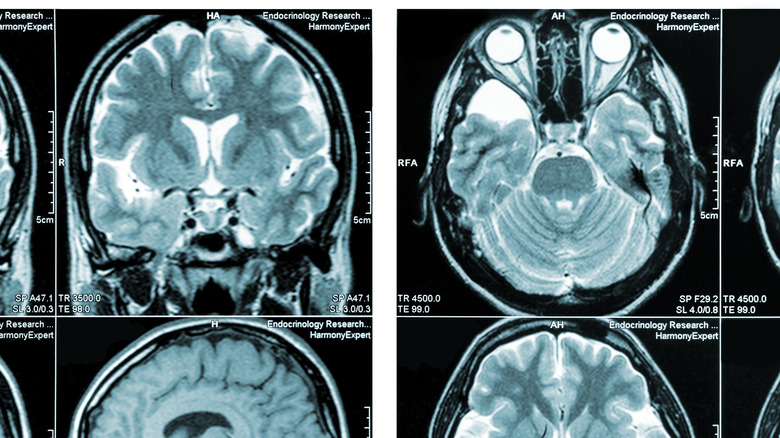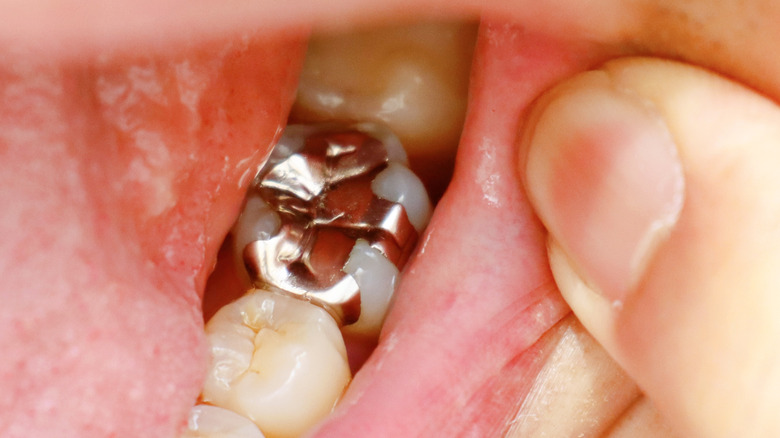11 Uncommon Triggers Of Multiple Sclerosis
Multiple sclerosis is a progressive neurological disease that can become debilitating over time. The National Multiple Sclerosis Society reports that approximately one million adults in the United States have been diagnosed with multiple sclerosis (MS). The number of impacted adults has more than doubled over the past 40 years, proving there is a need for more research and awareness about the disease, as much is still not understood.
While there are several known risk factors, including genetics, age, and gender, many triggers are less commonly recognized. These triggers can include air pollution, infections, vitamin D deficiency, obesity, and even fillings in your teeth. Multiple Sclerosis News Today reported that even certain occupations and geographic locations can increase the risk of developing multiple sclerosis. And some of these triggers may not only relate to the development of the disease, but might also cause symptoms to flare up or worsen.
For people with MS, the impact of the disease can be significant, affecting everything from mobility and vision to cognitive function and emotional well-being. While there is currently no cure, early diagnosis and treatment can help slow the disease's progression and improve quality of life. Therefore, it is crucial to continue to research and raise awareness of the known risk factors and the lesser-known triggers of MS to understand better and manage this debilitating condition (via Healthline).
Understanding multiple sclerosis
Multiple sclerosis (MS) is a chronic autoimmune disease that affects the central nervous system (CNS). This means that the immune system attacks the myelin sheath, the covering that shields the nerve fibers, resulting in a range of symptoms that can vary in severity from person to person. Unfortunately, MS is a progressive disease, so symptoms worsen over time (via the Mayo Clinic). Although the exact cause of MS is unknown, it is thought to be a combination of genetic and environmental factors. It affects more women than men, and is typically diagnosed between 20 and 40.
According to the National Multiple Sclerosis Society, MS symptoms vary in severity and presentation, making it challenging to diagnose patients. Some common symptoms include fatigue, muscle weakness, difficulty with balance and coordination, limb numbness or tingling, and vision problems. In some cases, MS causes severe disability and can impact a person's capability to carry out daily activities.
Although there is no cure for MS, available treatments can help manage symptoms and slow the progression of the disease. These treatments include medication to reduce inflammation, physical therapy to improve strength and coordination, and lifestyle changes to promote overall health and well-being. By taking proper care, many people with MS can lead fulfilling and active lives.
Uncovering the link between low vitamin D and multiple sclerosis
Did you know that a lack of vitamin D during pregnancy could put your child at risk for developing multiple sclerosis later in life? A study published in the Journal of American Medical Association showed that developing fetuses depend on their mothers for essential nutrients, including vitamin D, which is critical for healthy growth and development. But that's not all — Neurology published a study revealing that people living in areas with limited sunlight exposure are more prone to MS than those living in sunnier locations. The reason? Sunlight triggers the body to produce vitamin D, which helps keep the immune system in check.
Fortunately, vitamin D supplementation has been found to lower the risk of developing MS and improve symptoms in those who already have it. It can also help reduce inflammation and enhance immune function. By taking simple steps such as getting enough sunlight, maintaining a balanced diet, and taking vitamin D supplements, you can reduce the risk of MS (per the Mayo Clinic).
Could there be a link between cow's milk protein and multiple sclerosis?
Could your love for milk and dairy be harming your brain's health? A recent research study published in PNAS has shown that consuming casein, a protein found in cow's milk and dairy products, can cause an immune system reaction that results in inflammation and myelin loss similar to that seen in multiple sclerosis. The researchers discovered that anti-casein antibodies could cross-react with a protein called myelin-associated glycoprotein, destroying oligodendrocytes, the cells that produce myelin. Surprisingly, the study found that MS patients with higher levels of antibodies against casein should avoid dairy. These findings highlight the importance of further research into how environmental factors, including diet, can influence the development of neurological diseases such as MS. Meanwhile, researchers are working on a self-test for patients to check their levels of antibodies against casein, which could provide valuable information about the role of dairy in MS and other neurological diseases.
If you're concerned about dairy and want to avoid cow's milk, Healthline suggests switching to almond milk, soy milk, or oat milk. Furthermore, when green vegetables, sardines, nuts, and seeds are included in the diet, they can be good alternate sources of vitamin D and calcium.
There is a link between air pollution and multiple sclerosis
There is evidence in several studies mentioned in Frontiers in Public Health that suggest that air pollution, especially fine particulate matter, may be a trigger of multiple sclerosis. According to the research, air pollution can cause nervous system inflammation and damage, exacerbating autoimmune conditions like MS. Furthermore, another study published in Environmental Science and Pollution Research International concurred that people living in areas with high levels of particulate matter are at a significantly higher risk of developing MS. In addition, the same study found a lower risk of MS was associated with less pollution exposure.
While the exact mechanisms by which air pollution may cause MS are still being researched, these findings emphasize the importance of reducing exposure to air pollution to prevent and manage MS. If you live in an area known for high pollution, you should take every precaution possible. The American Lung Association suggests avoiding outdoor activities when the daily pollution report is high. You can get daily updates on the state of the air quality by checking your local forecast. Avoid burning wood, and consider using electric products for yard work and other outside chores, as gas-powered lawn equipment can pollute the air and harm the environment more than gas vehicles.
Childhood obesity and the startling connection to multiple sclerosis
While most of us know that obesity can lead to a range of health problems, a lesser-known consequence is the increased risk of developing multiple sclerosis. Research has shown that individuals who are overweight or obese before age 10 may be at a higher risk of developing MS later in life. Even more alarming is the statistic in another study that showed childhood obesity puts obese kids at two times the risk of developing MS later in life (via National Multiple Sclerosis Society).
The reason behind this link lies in the body's response to chronic inflammation caused by obesity. This inflammation can damage the myelin sheath that protects nerve fibers in the brain and spinal cord, leading to MS. Eradicating childhood obesity can reduce the incidence of MS by 15%, according to a review published in the Journal of Neurology and Neuromedicine.
These findings highlight the need for a healthy lifestyle that includes regular exercise and a balanced diet to manage and reduce the risk of developing MS. By understanding the complex relationship between obesity and MS, we can take steps to protect ourselves and our loved ones from this debilitating disease.
Could a viral infection trigger multiple sclerosis?
Multiple sclerosis is a complex disease that doesn't have a single cause, but rather a combination of factors that can trigger it. One of these triggers is certain viruses, which can cause an immune response in individuals with a genetic predisposition to MS. When this happens, the disease can develop or worsen.
Researchers have discovered that immune proteins can be found in the spinal fluid of up to 95% of people with MS, which is a significant finding as these proteins are a response to viruses (via the National Multiple Sclerosis Society). A recent study published in Science found that infection with the Epstein-Barr virus (EBV), a herpes virus that causes mononucleosis, can increase the risk of developing MS by a factor of 32. However, infection with other viruses did not have a similar effect on MS risk.
These findings are important because they highlight the need for a vaccine to prevent the EBV virus. If such a vaccine were to be developed, it could significantly decrease the number of MS cases (per the Harvard T.H. Chan School of Public Health).
Dental fillings and multiple sclerosis
Mercury is a harmful metal used in amalgam (silver) dental fillings. Its potential toxicity has been a subject of debate for many years. While dental fillings are generally considered safe, there are concerns that mercury may leak from the fillings and accumulate in the body, particularly in the brain and nervous system. There is no conclusive evidence that dental fillings can trigger multiple sclerosis. However, some studies suggest a possible link (via Multiple Sclerosis News Today).
For instance, a study published in Science of Total Environment showed that MS patients with silver amalgam fillings had significantly lower levels of specific blood components, higher blood urea nitrogen, and lower serum IgG than those without silver amalgam. Hair mercury levels were also significantly higher in MS patients with amalgams. The study suggests a possible link between dental amalgams and the worsening of MS symptoms, but further research is needed to understand the relationship between the two fully.
The U.S. Food and Drug Administration (FDA) found that certain groups of people may be at a higher risk for possible harmful effects from silver fillings, and therefore they advise that pregnant and nursing women, children under the age of 6, and individuals with pre-existing conditions such as MS avoid getting silver fillings that may contain mercury.
Managing stress is key to controlling MS flare-ups
While stress is a normal part of daily life, it can trigger flare-ups for those with multiple sclerosis. Managing this condition comes with unique challenges, and stress is one of the most significant factors to consider. According to a study published in Brain, Behavior, and Immunity, over 40% of MS exacerbations were related to stressful life events, making it vital to learn how to manage stress successfully. To understand how stress affects your body, try keeping track of symptoms or events that occur before a flare-up and use relaxation techniques and coping mechanisms tailored to your needs.
Whether practicing mindfulness, exercising, or seeking support from loved ones, taking steps to manage stress can significantly affect how you cope with MS. Stress is an unavoidable part of life, but it doesn't have to control you. By actively managing stress, you can regain a sense of control over your life (via MyMSTeam).
Sex hormones and multiple sclerosis
Although both men and women can get MS, women are three times more likely than men to be affected. However, while women tend to have more relapses, men often have a faster decline and disease progression, which leads to disability sooner, according to the American Journal of Managed Care (AJMC). The underlying cause of this gender disparity remains unknown. However, the AJMC suggests that hormones may be involved. Given the lower incidence of this disease in the male population, testosterone in men may play a role in preventing it. Only as men age and their testosterone levels fall do they appear to have an increased likelihood of MS development.
In addition, estrogen, a hormone found in higher levels in females, may impact the immune system. However, having normal or lower estrogen levels does not prevent MS development. Interestingly, women with higher levels of specific estrogen hormones, such as estradiol and estriol, have been shown to experience fewer exacerbations of MS. This effect is particularly noticeable during pregnancy, when these hormones are naturally elevated. Estrogen therapy may also potentially reduce the frequency of flare-ups and improve MS symptoms (via WebMD).
Quit smoking for better MS outcomes
Studies have shown that smoking may increase the risk of developing MS, according to the MS Society. A study published in Therapeutic Advances in Neurological Disorders reported that smoking is a significant risk factor for developing MS, with smokers having a 50% higher risk of developing the disease than nonsmokers.
Additionally, smoking in patients with MS is reported to accelerate the rate of disability and exacerbate relapses (per MS Society). It can worsen confusion, dizziness, fatigue, and vision during an exacerbation. Therefore, it's unsurprising that the Cleveland Clinic mentions that quitting smoking can have numerous health benefits for MS patients. Not only does it reduce the risk of developing other comorbidities associated with smoking, but it can also slow the progression of MS and improve the overall quality of life.
Quitting smoking can be challenging, but many resources are available to assist individuals. These resources include nicotine replacement therapy, behavioral counseling, and support groups. Working with a healthcare provider to develop a quit-smoking plan can also increase the chances of success.
Bacterial infections and multiple sclerosis
Multiple sclerosis is a complex disease. Research has identified many potential triggers for MS, including bacterial infections. According to a review article published in Frontiers in Microbiology, bacterial infections may activate the immune system, leading to an immune response that targets the central nervous system in individuals with a genetic predisposition to MS. This response can cause inflammation and damage to the myelin sheath, resulting in the characteristic symptoms of MS.
Some bacteria identified as potential MS triggers include Staphylococcus aureus, Chlamydia pneumoniae, and gastrointestinal bacteria such as Helicobacter pylori. However, according to a study published in Current Neurovascular Research, a single bacterial pathogen has not been associated explicitly as the causative factor.
While bacterial infections may be a factor in the development of MS, other factors, including genetics and environmental factors, also play a role. Research continues to investigate the complex interplay between these factors and how they contribute to the development and progression of MS.
Exposure to solvents may be a trigger for individuals with MS genes
A study published in Neurology found that exposure to paint or other solvents, when coupled with genetic predisposition to MS, can increase one's likelihood of developing MS (via National Multiple Sclerosis Society). Solvents may include varnish, glue, and paint. Essentially anything that dissolves a solid to form a solution is considered a solvent.
Furthermore, the risk is even greater for individuals with a smoking history and exposure to solvents. They are at a 30-fold higher risk of developing MS than those without these risk factors. Further research is necessary to understand the precise mechanisms underlying the increased risk of developing multiple sclerosis associated with the combination of smoking, MS genes, and exposure to solvents. For individuals with a family history of MS, making lifestyle changes to avoid certain substances, especially in combination, is recommended to reduce the risk of developing the disease. Taking proactive measures to reduce exposure to environmental toxins and other risk factors may help mitigate the risk of developing MS and other neurological conditions. It is essential to seek guidance from healthcare professionals and genetic counselors to determine appropriate strategies for reducing the risk of developing MS based on individual risk factors and personal medical history (via World Health).













